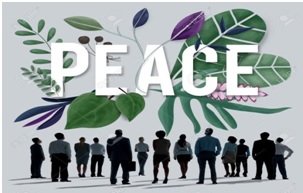During the current pandemic, we have witnessed the spread of COVID-19 in our communities, starting from an animal source or non-vegetarian food in Wuhan, China, to six continents of the world. COVID-19 is a zoonotic disease, which is an infectious disease like Ebola and HIV. If we want to control this pandemic, we should follow some rules and regulations and become self-regulated. According to my opinion, Jain principles guide us to live in harmony with the ecosystem.
Jainism is rooted in scientific principles. It is one of the oldest religions in India. Jain scholars believe that everything that is a living or nonliving component present on the earth or ecosystem is interdependent on each other and has its own equal importance. In order for everything to function in equilibrium, we must live in harmony within this ecosystem. It means that instead of destroying, we must preserve; instead of harming, we must strengthen; and instead of exploiting nature, we must nourish and protect it.
In order to acquire these ways of life, one must observe the five fundamental principles that are actually harmonious means of coexistence with oneself, society and the whole existence and can be the cause of liberation through this human life. These five fundamental principles are:
Non-violence – Ahimsa
1. Truth: Satya
2. Non-stealing (Achaurya or Asteya)
3. Celibacy/Chastity: Brahmacharya
4. Non-attachment/Non-possession: Aparigraha
Out of Five principles, I will discuss the Principle of Nonviolence here.
Non-violence (Ahimsa)
Non-violence (Ahimsa) is the Cardinal principle or Cornerstone of Jainism. Non-violence is the supreme religion (Ahimsa Parmo Dharma) which means, "Do not injure, abuse, coerce, insult, torture, or kill any creature or living being."
The Attitude of Saving Every Life
According to Jainism, all living beings, irrespective of their size, shape, or different spiritual developments, are equal. No living being has a right to harm or kill any other living being, including animals, insects, and plants. Every living being has a right to exist, and it is necessary to live with every other living being in perfect harmony and peace.

That’s why Jain people do not kill an ant or any small living creature. They try to save lives. I want to quote one incident here. On a fair day, I visited my friend’s house. We were enjoying very good communication. Suddenly, she encountered a cockroach inside her house. Her first instinct, after screaming in fear, was to use bug spray to kill it. But without any hesitation or fear, I picked up the cockroach using two pieces of paper and moved the insect outside the house, where it was free to continue living its life. Astonished and impressed with my courageous act, she asked me how I did this. "This is our way of life," I replied with a smile. “We do not destroy any living beings in this household.”
Muhapatti: Non-Violent Inhaling

Practically, it is impossible to survive without killing or injuring some of the smallest living beings. Some lives are killed even when we breathe, drink water, or eat food. Therefore, Jainism says that the minimum killing of the lowest form of life should be our ideal for survival. People who practice Jainism strictly, such as monks, wear a muhapatti across their face tied behind their ears, which is basically a cloth covering. Jain monks have donned mouth coverings for centuries to prevent the inhalation of small insects and microbes. Jains believe that during the inhalation process, such organisms are killed, and therefore, the coverings, along with practicing ahimsa, protect all forms of life. Within the daily practices of a Jain, every action considers the existence of microbes. The Centers for Disease Control and Prevention (CDC) recently advised citizens to wear a cloth face and mouth covering when out in public. The recommendation is due to the COVID-19 pandemic that has currently affected our nation. The coverings are a way to mitigate the spread of the airborne disease.
Pacifist Eating and Drinking
Jains are required to clean water through a filter cloth in order to remove pathogens and make the water fit for drinking. After using the filter cloth, Jains dip the cloth back into the original water body to free the microbes that are stuck on the cloth from their world. Again, the main reason for doing this is to protect and preserve the microbes.
The most popular notion in Jainism is to eat vegetarian meals. In addition to restricting the consumption of meat, Jains are expected to avoid roots and tubers. According to Jain scholars, uprooting roots and tubers disrupts the lifestyle of insects and microorganisms that are embedded beneath the ground. As a result, we may harm them.
It is more painful if a life of the higher forms (more than one sense) is killed. Hence, Jainism allows people to use only vegetables as food for survival. All non-vegetarian food is made by killing a living being with two or more senses. Therefore, Jainism preaches strict vegetarianism and prohibits non-vegetarian foods.
Research Supporting NonViolence
David Quammen, author of Spillover: Animal Infections and the Next Human Pandemic, added that humans are constantly disrupting the ecosystem by invading tropical forests, aquatic ecosystems and so many species of animals, plants, and microbes.
According to researchers at Harvard, T. H. Chan, School of Public Health, climate change also causes disruption in habitats of animals and plants and thus plays a role in the occurrence of diseases. We are in a partnership with animals and plants in this ecosystem, so if we change the climate on earth, it will affect that partnership. In order to reduce the risk of infectious diseases, we must do everything we can to reduce greenhouse gas emissions and limit global warming in order to protect our environment.
Ahimsa:the Ray of Hope
The National Geographic Dictionary defines an ecosystem as a geographic area where plants, animals, and other organisms, as well as weather and landscapes, work together to form a bubble of life. My hope is that the lessons learned from Covid-19 will encourage us to, once again, preserve, strengthen, and nourish the ecosystem. As a result, we will do our part to practice ahimsa and live in peace and harmony with all organisms.
Blog Author
Dr. Karuna Jain
(Head, department of Management Studies )
Sobhasaria Group of Institutions, Sikar
Blog Editor
Dr. Rajesh Kumar Gaur
(Dept. of English)
Sobhasaria Group of Institutions, Sikar

